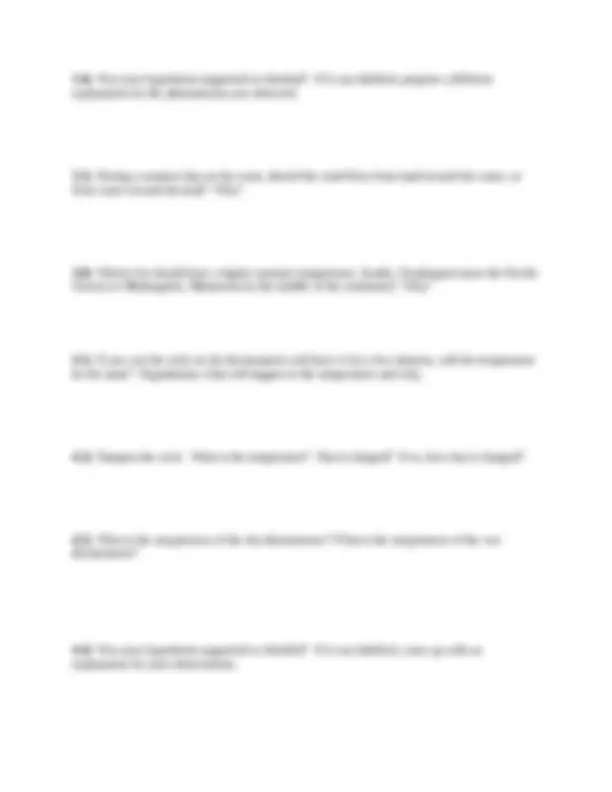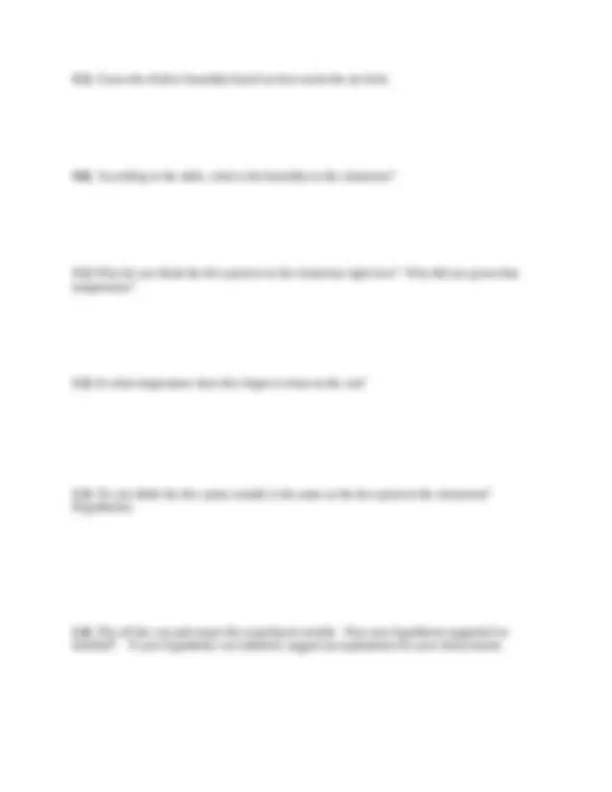




Study with the several resources on Docsity

Earn points by helping other students or get them with a premium plan


Prepare for your exams
Study with the several resources on Docsity

Earn points to download
Earn points by helping other students or get them with a premium plan
Community
Ask the community for help and clear up your study doubts
Discover the best universities in your country according to Docsity users
Free resources
Download our free guides on studying techniques, anxiety management strategies, and thesis advice from Docsity tutors
Material Type: Lab; Professor: Hannula; Class: Earth Systems Science; Subject: Geology; University: Fort Lewis College; Term: Unknown 1989;
Typology: Lab Reports
1 / 4

This page cannot be seen from the preview
Don't miss anything!



Earth Systems Science
1.1) What do you think will happen to the temperature of the can of compressed gas when you release some of the gas? (Releasing the gas will decrease the pressure on the gas contained in the can.) Should it stay the same, get hotter, or get colder? Formulate a hypothesis. 1.2) Why do you expect that the air within the can should stay the same temperature, get hotter, or get colder? 1.3) Release some of the gas. Was your hypothesis supported or falsified? If it was falsified, explain why the temperature behaved in the way that it did. 1.4) When air rises, its pressure decreases. What should happen to the temperature of a parcel of air as it rises? 2.1) What should happen to the air in the chimney above the candle? What should happen to the air in the chimney that is not over the candle? Formulate a hypothesis about how the air in the box should move. 2.2) Why do you think the air will behave in the way you hypothesized it would? 2.3) Sketch what happens to the incense smoke.
2.4) Does your observation support or falsify your hypothesis? If your hypothesis was falsified, come up with a new explanation of what happened. 2.5) When sunlight strikes the ground, the ground absorbs energy and warms up. The warm ground, in turn, heats the air just above it. What should happen to that air? 2.6) Major forest fires are said to "make their own weather." How do large forest fires affect local wind directions? Why do they affect local wind directions? 3.1) Which do you expect should heat up faster, the water, the dry sand, or the wet sand? Formulate a hypothesis. 3.2) Turn on the light and record the temperature at about one-minute intervals for about ten minutes. Record your observations in data table 3.2 on your answer sheet. Time (min.) Water temperature Dry sand temperature Wet sand temperature 0 1 2 3 4 5 6 7 8 9 10 3.3) On graph paper.
4.5) Guess the relative humidity based on how moist the air feels. 4.6) According to the table, what is the humidity in the classroom? 5.1) What do you think the dew point is in the classroom right now? Why did you guess that temperature? 5.2) At what temperature does dew begin to form on the can? 5.3) Do you think the dew point outside is the same as the dew point in the classroom? Hypothesize. 5.4) Dry off the can and repeat the experiment outside. Was your hypothesis supported or falsified? If your hypothesis was falsified, suggest an explanation for your observations.